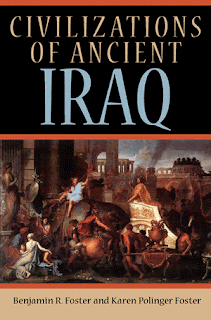 |
| Cover Image Princeton University Press |
Ancient Mesopotamia, meaning land between two rivers,
resides in modern day Iraq including parts of Syria, Turkey and Iran, contained
many ancient civilizations such as the Sumerians and Babylonians. These ancient
civilizations ruled the Fertile Crescent from 3100 BCE to around 600 CE.
Ancient Historians have a plethora of primary sources written in Cuneiform on
tablets, yet many of these tablets remained not translated. Many journal
articles have been written on the subject of Ancient Mesopotamia with several
books published on the subject as well, but the journals are more prominent in
number and harder to obtain because of the expensive cost of the academic
journals. The scholarly books are more affordable yet few published volumes are
pleasing to read. Princeton University Press’ book Civilizations of Ancient Iraq by Benjamin Foster and Karen Foster
is the latest scholarly work to spread its knowledge to the masses. Benjamin Foster teaches at Yale University in the Near Eastern Languages and Civilizations
department. As Professor of Assyriology
and Babylonian Literature and Curator of the Yale Babylonian Collection, Dr. Foster
exemplifies his expertise as an expert in Ancient Mesopotamia, especially in
Akkadian literature with his earlier publication titled Before the Muses, a translation of a plethora of Akkadian
literature sources. In addition to Dr. Foster holding a professorship at Yale
University, Karen Foster also
holds a teaching position at Yale University in their Near Eastern Languages and Civilizations
department. Her expertise rises in Art of the Ancient Near East and Aegean.
Both Fosters received their PhD from Yale University. One would deduce from the expertise of Dr.
Benjamin Foster and Dr. Karen Foster and the scholarly reputation of Yale that Civilizations of Ancient Iraq delivers as a cornerstone volume on Ancient Mesopotamia……
The excitement about this book elates because a scholarly
press decided to make an up to date book on Ancient Mesopotamia with many books
publishing in the twentieth century. Alas,
the book failed miserably as a scholarly work with many flaws. I absolutely believe both authors are the foremost
experts in their fields yet Princeton University Press failed two reputable
scholars. To start, the writing style is
not scholarly at all. The syntax of the Civilizations
of Ancient Iraq transforms from bad to terrible throughout the book. At a
depthless view of the book, the context of each chapter looks enticing to one whom
has a mild interest in Ancient Mesopotamia, however, when a deeper look is
taken to each individual chapter the glow of this promising book falls apart. The
style of the writing is atrocious with an almost too simplistic syntax that
includes short choppy sentences. On top
of the awful writing style the authors, for some unseen reason, decided to add
unnecessary commentary on present day Iraq that had nothing to do with Ancient
Mesopotamia. The only reason one can
fathom that authors elevate modern day Iraq in a book focused on Ancient
Mesopotamia is to highlight the current destruction taken on these ancient
sites from armed conflict and looters. Yet, this book delves into too much
depth into modern Iraq. A better solution entails creating a separate chapter
at the end of the book to highlight the problems ancient sites face in modern
day Iraq. Though the blame, if one wants
an easy scapegoat, would fall at the feet of the authors, one would be wrong to
lay the problems with the book on the authors. Princeton University Press
shoulders much of the blame for the less than extraordinary work of
scholarship.
Blame shoved on the publisher correctly indicates the
disastrous scholarly work that contains the publisher’s insignia since the
publisher gave the green light to print the manuscript it had received and
vetted to its standards. Though without further evidence one considers the
aforementioned book a minor blip for Princeton University Press, yet there are
several more books owned and produced by the press that shifts more evidence
that the problem is not with the authors but with the press editor(s). To
receive his or her PhD from Yale University one must demonstrate their
exemplary writing style to communicate in a professional and scholarly
manor. I have full faith that both
Benjamin Foster and Karen Foster can communicate scholarly work in a
professional manner for two reasons. Firstly, one does not defend their
dissertation with success from an Ivy League institution; both authors have
completed their dissertations at Yale. Secondly, professors that teach at Yale
University illustrate their scholarly skills. Since both authors teach at Yale,
then one can see Yale has the utmost faith in their academic publishing
skills. Princeton University Press
printed other scholarly works that have failed in the style and manner expected
from a scholarly press.
Grade: D-
No comments:
Post a Comment